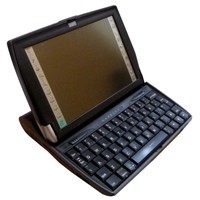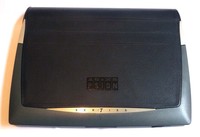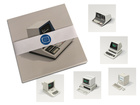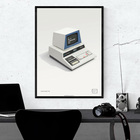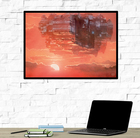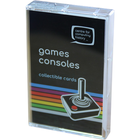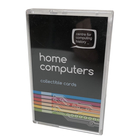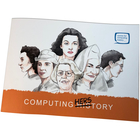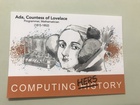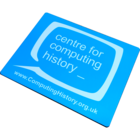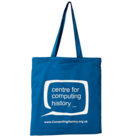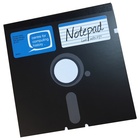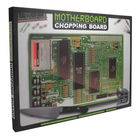Psion Series 7
| Home > Browse Our Collection > Computers > Psion > Psion Series 7 |
|
The Psion Series 7 is a subnotebook computer from Psion that was released in 2000. In size it is fairly original - larger than a palmtop or handheld machine, but smaller than a laptop computer. It was the first of the Psion series to have a full color screen - and the last. It has a leather-bound clam-shell design, with a touch-sensitive, VGA-resolution LCD screen and QWERTY keyboard. Internally it boasts a 132.71 MHz StrongARM SA-1100 processor, 16 MB of RAM (upgradable to 32 MB) and 16 MB of internal ROM.
The machine runs the EPOC operating system (a predecessor of Symbian OS), and as such, can be programmed in the Open Programming Language (OPL), using the provided development program, or in C++ or Java using a separate PC-hosted development system. It can be synchronized to a PC by means of an RS232 port to serial connector, a method that is antiquated by modern standards.
The unit has an expansion port for a Compact Flash (CF II) device such as the Hitachi Microdrive. It also has a PC Card expansion port, but the EPOC operating system had little support for devices other than flash memory. For data transfer between Psion computers and to use mobile phones as modems the Series 7 features IrDA (infrared) connectivity.
The Series 7 is a variant of the Psion netBook, a machine aimed at the corporate market. Due to customer demand, the "cut-down" Series 7 was released, distinguished by replacing 16 MB of the 32 MB of RAM with a 16 MB ROM chip. Accessing the OS in ROM required slowing the processor down, leading to the false perception that the netBook and Series 7 used different processors or PCBs. It is therefore possible to convert the Series 7 to netBook configuration by replacing this memory card. However, at least two different (interchangeable) PCBs were used during the product's lifecycle, the later PCB distinguished by higher power output to the PC card.
Release Date 1999
Price £699.99 Processor Intel 132.71MHz StrongARM 1100 Ram 16 MB Internal Memory, expandable to 32 MB Internal DRAM Power Rechargable Li-Ion Main battery Backup battey Rechargable Li-Ion Main battery with lithium cell backup battery Communication RS232 serial port and IrDA Port (max 115 kbit/sec), Full communications suite including E-mail, Fax, SMS and Web browser Keyboard 58-key standard layout keyboard. Expansion Compact Flash Slot Type I/II, PC Card (Type I/II) Size 9.2" x 7.1" x 1.5" Weight Weight 1150g including battery pack Screen 640x480 pixels back-lit STN LCD, 256 colours Sound inbuilt microphone and speaker Our Psion 7, which is complete with manual, was very kindly donated by Nick Senior.
Nick made the following comments
"It really is a gem and I shall miss it (I've only just now realised that in addition to the wonderful feel of the machine, it also has a wonderful smell)" "It was a great example of how visionary a British company could be, making the demise of Psion even more sad. It is still a considerably nicer machine to use than the notebook I'm writing this email on, from the optimised keyboard layout, weighting and shear quality of manufacture."
Manufacturer: Psion Comment on This Page Psion Series 7 Manuals:
Other Systems Related To Psion Series 7:
This exhibit has a reference ID of CH7004. Please quote this reference ID in any communication with the Centre for Computing History. |
Click on the Image(s) For Detail
|


